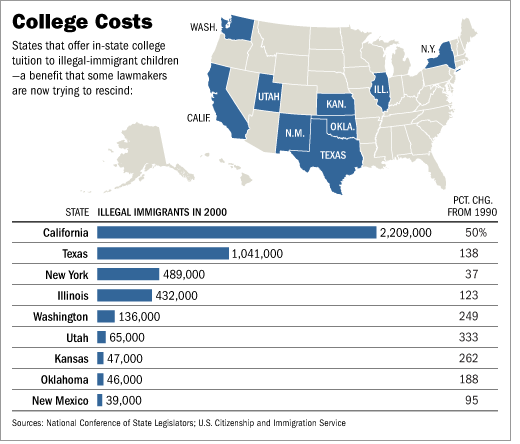Should Illegal Immigrants Get Tuition Help?
February 22, 2006; Page A4, The Wall Street Journal
WASHINGTON -- An emotional state-level dispute over college tuition shows how tough it will be for Congress to overhaul immigration laws and extend citizenship benefits to the country's estimated 11 million illegal immigrants.
Four years ago, California passed a law granting in-state tuition to students who were in the U.S. illegally but had graduated from a California high school. Eight other states followed, allowing illegal immigrants to attend public colleges for in-state student fees -- usually less than half what out-of-state students pay.
DiAnna Schimek, a Democrat who heads the Nebraska Senate's education committee, says she has pushed for an in-state tuition bill for illegal immigrants as a matter of compassion and economic calculation. "These children didn't bring themselves" but were brought by their parents, she says. "It's only a good investment on our part to make certain they are productive citizens."
But attitudes have been hardening as an estimated 400,000 illegal immigrants flood in yearly. "That's an alarm to the people here ... it's a drain on the economy," says Rep. Glenn Donnelson, a Utah Republican who heads an education committee in his state.
So while some legislators want to extend tuition benefits to illegal immigrants in their states, others are calling for laws to deny the benefit -- or take it back.
Lawmakers in Utah, Kansas and New Mexico -- which passed in-state tuition benefits only two or three years ago -- now are waging uphill fights to repeal them. Massachusetts legislators last month rejected a bill to offer in-state tuition benefits to illegal immigrants.
Six states are considering measures that would deny in-state tuition, tuition waivers or state scholarships to illegal immigrants. In New York, which offers in-state tuition to illegal immigrants, and Virginia, which recently passed a law offering benefits to some, bills have been introduced to bar illegal immigrants from attending public colleges.
Meanwhile, lawsuits challenging in-state tuition for illegal immigrants have been filed in California and in Kansas. "There's something wrong with giving a benefit to an illegal that we don't even give to citizens of other states," says state Rep. Becky Hutchins, a Kansas Republican leading a repeal effort there.
The tuition laws generally require illegal immigrants to have attended a local high school for three years, to have graduated or earned a high-school equivalency and to sign an affidavit promising to legalize their immigration status as soon as they are eligible.
Promoters expect few students to actually take up the benefit. Dropout rates are high and academic scores generally are low among Hispanics, who account for the majority of illegal aliens. And even in-state tuition, which averages about $5,500 this year, may be out of reach for children whose parents typically hold minimum-wage jobs.
Kris Kobach, a University of Missouri law professor who brought a federal suit against the Kansas program, says 221 illegal immigrants are enrolled in Kansas public colleges this year, and that even when the benefit becomes widely known, the number probably wouldn't exceed 2,700.
Even so, in-state tuition laws have become flashpoint among some voters who feel they haven't any other way to protest illegal immigration. Federal laws allow illegal immigrants to use emergency medical services, and a 1982 Supreme Court decision entitles their children to public education through high school.
Rod Adair, a New Mexico state senator who introduced unsuccessful legislation to repeal his state's immigrant-tuition benefit, says he was acting "in response to my constituents. They're frustrated."
Prof. Kobach's suit contends Kansas's in-state tuition benefit violates a federal law that prohibits states from giving any benefit to an illegal alien that they don't also extend to all U.S. citizens.
Among his plaintiffs, Heidi Hydeman, an Iowa native, says she was charged out-of-state tuition by the University of Kansas, though she lived in Kansas for six years and paid Kansas income tax for three years while attending the school. "I thought it was unfair," says Ms. Hydeman.

Mr. Donnelson, the Utah legislator, says Utah would face a $34 million bill if a similar suit were filed there, and current out-of-state students were refunded the difference between in-state tuition and the nonresident tuition they pay.
But legislators' doubts go beyond that. Although illegal immigrants who get the tuition benefit pledge to legalize their status, there is almost no way they can do that under current laws. And even with a college degree, there is almost no way for illegal immigrants to legally get a job.
For years, congressional supporters have promoted a measure, called the Dream Act, that would clear up those problems. States would be allowed to offer in-state tuition to illegal-immigrant students who, in turn, could become citizens.
In 2003, almost half the Senate cosponsored the Dream Act. But the Dream Act's prospects have faded, and this year its pivotal supporter, Utah Republican Sen. Orrin Hatch, withdrew as a sponsor. "Realistically, the Dream Act will not pass" and should be included in an overhaul of immigration laws, he said.
But the tensions fueling opposition to in-state tuition laws are the same ones making it hard for Congress to pass immigration overhaul. A coalition of pro-business Republicans, Democrats, immigrant-rights groups and labor unions wants new federal laws that would let illegal immigrants eventually become citizens.
They are being stymied, however, by social conservatives, who worry about being culturally overwhelmed by immigrants, and by Republican national-security hawks, who are demanding that Washington cut off illegal immigration first. The tension prevented the U.S. House from taking up immigration overhaul last year, and is complicating the Senate's efforts to pass it this year.
Write to June Kronholz at june.kronholz@wsj.com2
| URL for this article: http://online.wsj.com/article/SB114057164091179647.html |